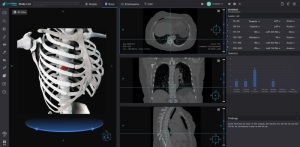by
Lisa Chamoff, Contributing Reporter | December 05, 2018
AI technology startup Infervision launched new product concepts last week at the 2018 annual Radiological Society of North America meeting in Chicago, including one that can detect four different conditions on one chest scan.
Among them was one for detecting four different conditions using the InferRead CT Chest, which screens for lung nodules, bone metastases and bone tumors, emphysema and cardiac calcification.
The company also showcased a product that uses AI to detect emergency conditions such as stroke and bone fractures as well as an AI product for mammography that identifies areas of interest in dense breasts. All are in the process of being tested.
“Since last year, way more hospitals around the world have started to adopt AI technology, including nearly 300 hospitals using Infervision’s technology,” Chen Kuan, Infervision’s founder and chief executive officer, told HCB News. “The big hospitals have started to adopt AI as their standard practice because they realize that with the help of AI they can indeed, by changing their clinical pathway a little bit, improve the efficacy and also reduce misdiagnosis.”
The Chinese company
showcased its lung nodule screening tool, InferRead CT Lung, at last year’s RSNA, and has improved the technology to include volume and density of the nodule. The technology is used by 70 percent of first-tier hospitals in China, and in the past week the company surpassed 26,000 lung cancer cases that have used the AI tool for screening.
The company, along with other startups, is currently exploring the regulatory pathway for its AI products in the U.S.
Use of the mammography product, according to Kuan, is valuable in China, as conventional CAD software is inefficient due to the difference in breast density amongst the Asian population. He also says the addition of the AI solution for detecting fractures will provide necessary assessments to aid in car crash investigations.
“So far the results for our AI product for mammography are very promising, but we need to do more tests," he said. "At the same time, it’s very tedious for humans to detect fractures well, but at the same time, it’s actually quite easy for AI to accomplish. Car crashes in China may not exactly be a life-or-death problem, but at the same time its causing a lot of headaches.”
